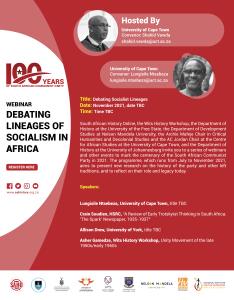Related Collections from the Archive
Webinar Programme: Debating Socialist Lineages.
Convenors: Shahid Vawda and Lungisile Ntsebeza
The Making of the Trotskyist Tradition in South Africa: A Reading of 'The Spark', 1935-1937 by Crain Soudien
Between 1935 and 1937 the Workers Party of South Africa published over thirty issues of their 'organ', as they called it, The Spark. The primary focus of this publication was to 'do battle against Imperialism and Capitalism and their conscious and unconscious supporters'. The publication developed a particular style and a template for what it would address. Characteristic was a combative and engaged form of writing focused on both global developments and the situation in South Africa. In this overview I attempt to distil the major themes that developed over the first three years of this publication to establish how the Workers Party of South Africa was positioning itself relative to international developments and the unfolding class struggle in South Africa.
Bio:
Crain Soudien was educated in the fields of education and African Studies at the Universities of Cape Town, South Africa and the State University of New York at Buffalo. His PhD dissertation from Buffalo was on South African youth identity. He is former deputy vice-chancellor of the University of Cape Town, where he remains an emeritus professor in Education and African Studies and the former Chief Executive Officer of the Human Sciences Research Council. He has an honorary appointment at the Nelson Mandela University, Eastern Cape. His publications in the areas of social difference, culture, education policy, comparative education, educational change, public history and popular culture include four books, four edited collections and over 220 articles, reviews, reports, and book chapters, including a 2017 publication entitled Nelson Mandela: Comparative Perspectives of his Significance for Education. He has an A-rating in the South African research system. He is involved in a number of local, national and international social and cultural organisations and is chairperson of the Independent Examinations Board, former chairperson of the District Six Museum Foundation, a former president of the World Council of Comparative Education Societies, and has served as the chair of three Ministerial Committees of Enquiry, including the Ministerial Committee on Transformation in Higher Education and the Ministerial Committee to Evaluate Textbooks for Discrimination. He is a fellow of a number of local and international academies and serves on the boards of a number of cultural, heritage, education and civil society structures.
National Front and Liberation: The South West African National Liberation Front in the 1960s by Asher Gamedze
This paper-in-process is interested in two experiences of attempting to build 'national fronts' in the context of the liberation struggle in southern Africa in the early-mid 1960s. The NLF (National Liberation Front) was established in Cape Town in 1962, it grew out of the Yu Chi Chan Club – a study group whose main topic was histories and strategies of guerrilla warfare with the interest of implementing that mode of struggle within the South African revolution. SWANLIF (South West African National Liberation Front) was established through a series of discussions between SWANU (South West African National Union) and SWAPO (South West African People's Organisation) in exile and processes internal to Namibia (South West Africa at the time) that encompassed a broader constituency, this process culminated with its founding in 1963. In different and similar ways, the two formations attempted to build an organizational form that was informed by non-sectarian politics and was capable of facilitating cooperation and coordination, rather than competition, within the national liberation movement. In three parts, this paper looks at some of the ideas, principles and roots of the 'front' as an organizational form and strategy. Second, the paper charts the trajectories and processes through which the NLF and SWANLIF were established including some of the political ideas that informed them within the context of their emergence. Third, the piece concludes with some preliminary reflections on understanding this form within the dynamics of the Southern African liberation struggle of the 1960s, why the particular attempts to organize in this fashion in many ways failed, and what is potentially generative in reflecting on them now, within a contemporary context where the national question remains urgently posed.
Bio:
Asher Gamedze is a cultural worker currently based in Cape Town, South Africa and working with/in various collectives as a musician, student, writer, organiser and educator. Dialectic Soul, his debut album as a bandleader was released in July 2020 and is available at: https://ashergamedze.bandcamp.com/album/dialectic-soul. Currently a fellow in the History Workshop at Wits University working on a PhD on the relationship between study and struggle in the history of the Yu Chi Chan Club and the National Liberation Front.
